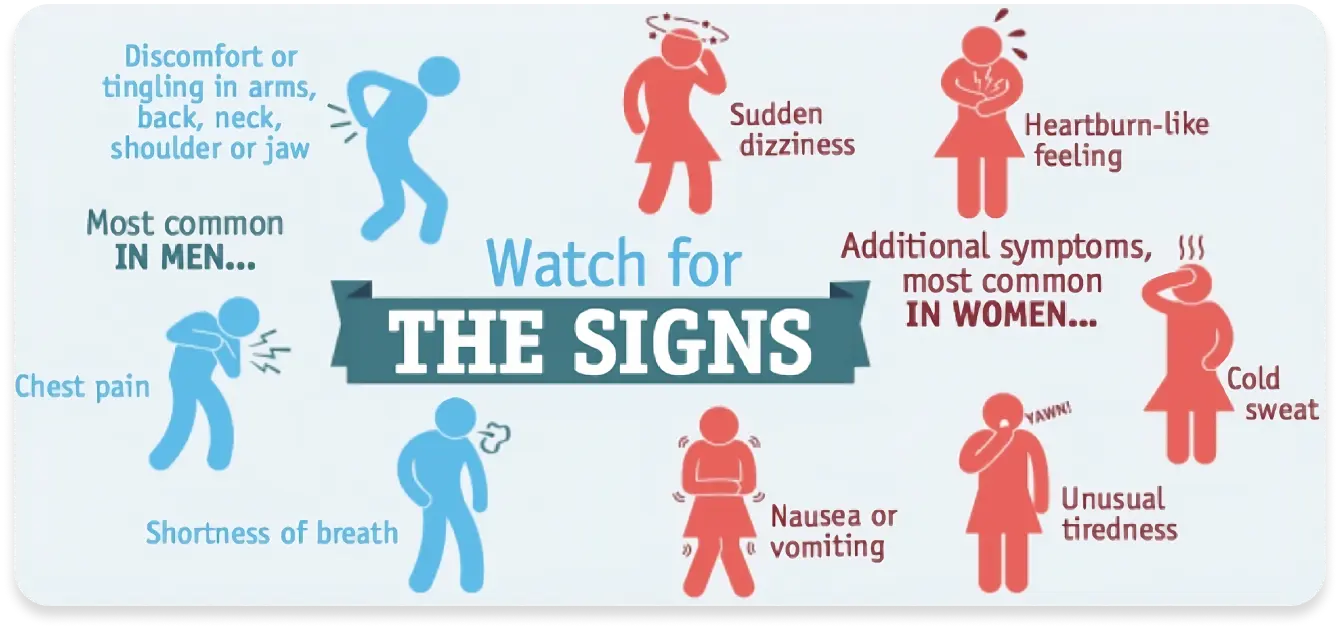Congestive heart
Did you know?
1 in every 4 deaths in America is caused by heart diseases. That is about 655,000 people every year!
Heart diseases have not only increased in the United States but also on a global scale. The rise in urbanisation, dietary changes, and shifts in occupational patterns have contributed to a worldwide increase in cardiovascular diseases, making it a critical global health concern.
What is exactly congestive heart failure and why should you be aware of it?
Heart failure or congestive heart failure is caused when the heart stops pumping blood to maintain blood flow to meet the needs of the body.
Symptoms and Signs to look out for
- Struggling to catch your breath when active or lying down.
- Feeling persistently tired and weak.
- Noticing swelling in your legs, ankles, and feet.
- Heartbeats acting out of rhythm.
- Finding it harder to engage in physical activities.
- A lingering cough with pale or pink-tinged phlegm.
- Frequent nighttime bathroom visits.
- Unexpected swelling in your abdomen.
- Rapid weight gain due to retaining fluids.
- Losing interest in food and dealing with waves of nausea.
- Experiencing difficulty concentrating or feeling less alert.
- Suddenly battling severe shortness of breath, accompanied by pink, frothy coughs.
- Chest pain as a potential indicator if your heart failure stems from a heart attack.


What puts at the risk of Congestive Heart Failure
Are you at the risk of a heart failure Know the following risk factors to check
- High Blood Pressure: Increased workload on the heart.
- Coronary Artery Disease: Limits oxygen-rich blood, weakening the heart.
- Heart Attack: Sudden occurrence, potential damage to heart muscle.
- Diabetes: Raises risk of high blood pressure and coronary disease.
- Certain Diabetes Medications: Rosiglitazone (Avandia) and pioglitazone (Actos) linked to increased heart failure risk.
- Certain Medications: Some medications associated with heart failure.
- Sleep Apnea: Nighttime breathing issues lower blood oxygen levels, increasing heart failure risk.
- Congenital Heart Defects: Structural defects from birth may contribute to heart failure.
- Valvular Heart Disease: Higher heart failure risk for those with valvular issues.
- Viruses: Viral infections may damage heart muscle.
- Alcohol Use: Excessive alcohol weakens heart muscle, leading to heart failure.
- Tobacco Use: Smoking increases the risk of heart failure.
- Obesity: Higher risk of heart failure for obese individuals.
- Irregular Heartbeats: Frequent and fast abnormal rhythms can weaken the heart muscle, potentially causing heart failure.
Preventive Measures that can save you
You can prevent heart failure by following a sustainable lifestyle by adopting following changes to empower your heart.
Embrace Smoke-Free Living
Give your heart the freedom from the grip of smoking.
Command Your Health
Keep high blood pressure & diabetes in check, placing the reins in your hands.
Fuel Your Vitality
Ignite your heart's potential with regular physical activity.
Nourish with Purpose
Feed your heart the goodness of healthy, wholesome foods.
Weigh the Right Way
Balance on the scale of heart health with a maintained, healthy weight.
Conquer Stress, Reign Over Life
Equip your heart to face the world by reducing and managing stress effectively.
We're here to provide the comprehensive care and support you need to manage these conditions effectively and improve your overall health and well-being, with the help of its wellness team we help the patients in adopting a healthy way of life which helps in reducing the risk of heart failures. Call us or schedule an appointment today, and let's work together towards a healthier, happier future,
Empower your heart with All Care with the strength of wellness; let it beat as a testament to the powerful choices you make each day.
Take Your First Step Towards a Healthy Heart





